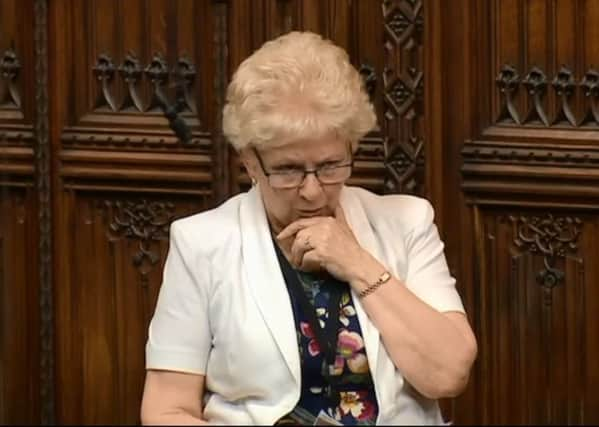Sudden move to fully decriminalise abortion in Northern Ireland opposed by 16,000 people


The issue will on Wednesday return for debate in the House of Lords before going back to the Commons for a final vote on Thursday under emergency procedures which the government triggered for the original – and uncontroversial – bill which was amended to legalise abortion and same-sex marriage.
On Monday night, the issue was debated by the Lords for the first time, with an often passionate debate taking place in a largely empty chamber.
Advertisement
Hide AdAdvertisement
Hide AdBaroness O’Loan said that a letter to the prime minister setting out their opposition to what is happening had received widespread support in the short time since last week’s developments.
She told peers that as well as being signed by politicians such as DUP leader Arlene Foster and “MLAs from all parties” including the SDLP’s Daniel McCrossan, Sinéad Bradley, Patsy McGlone and Justin McNulty, the lawyer Brett Lockhart QC, the economist Esmond Birnie, Catholic bishops and medics, including doctors and nurses “from all sides of the community”.
She said: “They wanted one thing: to be respected as people and to allowed to make their own law on this amendment. That shows how concerned people are about this matter.”
The former police ombudsman added: “I say to noble Lords with a heavy heart that ... they are walking on very sacred ground as they contemplate these issues. It is not just about abortion; it is about the whole devolved settlement, the integrity of government and the future peace and prosperity of all four parts of the United Kingdom.”
Advertisement
Hide AdAdvertisement
Hide AdHowever, Liberal Democrat peer Baroness Harris of Richmond rejected Baroness O’Loan’s opposition to the changes which had been overwhelmingly passed by MPs.
She said that the issue was “clearly a matter for the UK Parliament and not a devolved matter on the face of the devolution settlement” because it related to human rights. She added: “The UK Parliament has an obligation to act under international and domestic law to ensure access to free, safe and legal abortions in Northern Ireland.
Baroness O’Loan had tabled an amendment which would have reversed at least some of the changes which MPs had approved for abortion.
Conservative Lord Shinkwin, who has been disabled since birth, supported the amendment in passionate terms. He told peers: “I do not take a position on abortion per se; I do, however, take a position on disability equality. What is proposed in the bill drives a coach and horses through disability equality. I wonder whether my noble friend the minister ... has considered the message that changing the law to allow abortion on grounds of disability in Northern Ireland sends to the people of Northern Ireland, to the devoted parents and families of disabled children and, most importantly, to the disabled citizens of Northern Ireland.
Advertisement
Hide AdAdvertisement
Hide Ad“Today, Northern Ireland is the safest place in the United Kingdom to be diagnosed with a disability. If the bill is passed, that will change overnight on October 21.
“I invite noble Lords to consider the bill from the perspective of someone with Down’s syndrome. In England and Wales, the latest available figures show that 90% of human beings diagnosed with Down’s syndrome are aborted. Today, in Northern Ireland, disability-selective abortion for Down’s syndrome is not allowed. Instead, the culture is one of welcome and support for this disability.”
Lord Hayward, who opposed what Baroness O’Loan had tabled, said it was a “blocking amendment”, something she disputed.
However, the government opposed her amendment, with NIO minister Lord Duncan saying: “We have received from the other place an instruction on a free vote where it was a matter of conscience. No party set out to move this matter forward. It belonged to no party in particular; it was a free vote. We have received a clear instruction ... it is therefore important that we recognise that we have an obligation to fulfil.”
At that point – in line with convention in the Lords whereby contested amendments are not put to a vote at committee stage – Baroness O’Loan withdrew the amendment.